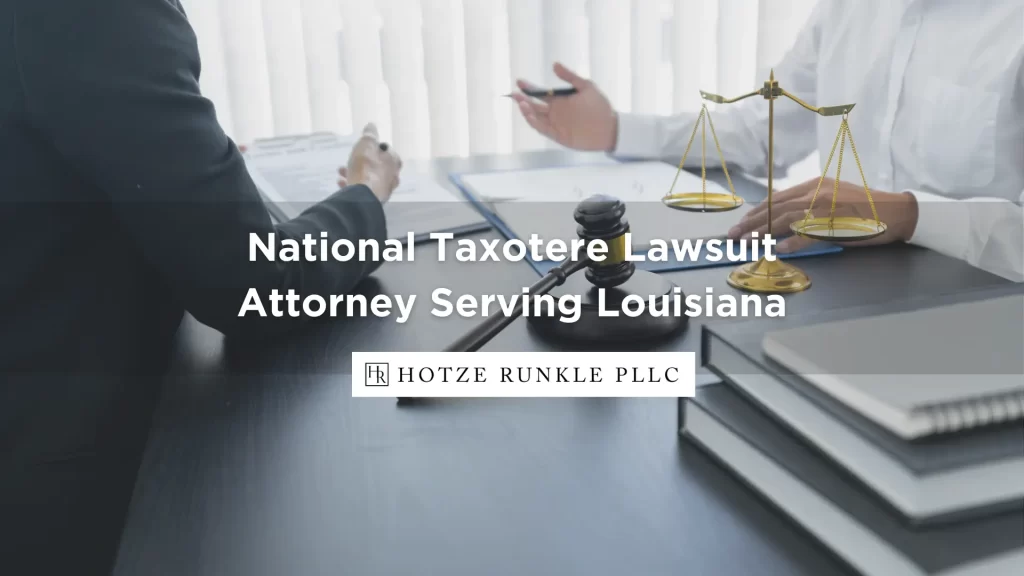
Do you or someone you know use the chemotherapy drug, Taxotere, also known as Doxacel? If so, it’s important you know that studies have confirmed with strong certainty that taking the drug Taxotere can lead to a serious eye condition called canicular stenosis.
The side effects of chemotherapy medications can often be discomforting, but people who use Taxotere have experienced serious side effects, including overflowing, watery eyes. If a patient is diagnosed with canicular stenosis, this condition may be permanent.
The experienced Louisiana medical malpractice attorneys of Hotze Runkle PLLC are actively investigating claims made by patients who were not aware of the dangerous side effects of taking this medication and suffered serious eye issues as a result.
There is evidence and general consensus among eye doctors that canicular stenosis is directly linked to the use of Taxotere. Sanofi-Aventis, a French multinational pharmaceutical company headquartered in Paris, manufactured the drug Taxotere. They are currently dealing with over ten thousand lawsuits, particularly among women who have survived breast cancer.
If you have developed watery, teary eyes following chemotherapy treatment, then take our Case Quiz to find out if you qualify for a Taxotere lawsuit today.
Why is Taxotere Dangerous?
Taxotere is a drug commonly used during chemotherapy to treat breast cancer.
This medication interferes with the growth of cancer cells. Studies have shown that weekly use of Taxotere, which is common during chemotherapy treatments, leads to the development of canicular stenosis—the condition causes chronic watery eyes and tearing.
Women who deal with this condition experience several symptoms, ranging from mild to severe. These symptoms include:
- Eye-watering
- Constant, excessive tears (epiphora)
- Blurred or clouded vision
- Vision loss (cystoid macular edema)
- Headaches
- Light sensitivity
- Eye irritations and infections
- Swelling of the eyelids
- Dry eyes (keratoconjunctivitis sicca)
These distracting symptoms can understandably affect daily life activities. Oftentimes, the side effects are so debilitating that they prevent women from doing everyday activities like driving, reading, getting dressed, or wearing make-up.
How Does Canicular Stenosis Develop?
Detecting and treating the early symptoms of watery, teary eyes—also called epiphora—can prevent canicular stenosis from developing. Epiphora is a side-effect of taking the chemotherapy drug Taxotere.
There are pathways in your eyes that extend from your tear ducts to your nasal cavity called canaliculi. When canaliculi pathways become obstructed, your tears will build up, and you’ll experience excessively watery eyes. An infection can develop which further impairs the canaliculi pathways.
This condition can be treated early on by inserting a bicanalicular silicone stent into the eye, which prevents excessive tearing.
However, if the condition is not treated and the canaliculi pathways become fully obstructed and close, canalicular stenosis develops. At this point, the side effect of having watery eyes may be irreversible and permanent.
Hotze Runkle PLLC’s Louisiana attorneys are prepared to help victims of Taxotere’s harmful side effect, whether they took Taxotere weekly, every two weeks, or every three weeks for any type of cancer.
Can I Really Sue the Company Who Created Taxotere for Compensation?
Pharmaceutical manufacturers are required by law to adequately warn and advise patients and doctors about all the side effects that are possible when taking their drug. Taxotere has been the standard treatment for many women undergoing chemotherapy treatments for breast cancer. As more women experience the devastating symptoms of canicular stenosis, they are suing the manufacturer in increasing numbers.
Sanofi-Aventis should be held accountable for the damage inflicted on women who were already in a vulnerable position due to their cancer diagnosis. Sanofi-Aventis prides itself on being “a global biopharmaceutical company focused on human health,” but that does not appear to be the case with its distribution of Taxotere. Building a case against Sanofi-Aventis will not only compensate the women who have suffered, it will hopefully also help protect additional women from experiencing the life-altering side effects of using Taxotere.
How Do I Know if I Qualify for a Lawsuit?
Under Louisiana law, there is a deadline, or statute of limitations, on the amount of time you have to file a personal injury lawsuit in court after an injury. In Louisiana, this deadline falls one year after the date of the injury occurred, or one year after you first discover the injury.
Attempting to file a lawsuit under the different civil lawsuit filing deadlines can be confusing and overwhelming. Louisiana’s civil statute of limitations vary widely depending on the case and circumstances along with the type of claim involved.
If you are dealing with a medical injury caused by a pharmaceutical company, it’s critical that you reach out to a local civil lawsuit litigation attorney as soon as possible. The qualified Louisiana lawyers at Hotze Runkle PLLC can help you determine if you are eligible to file a lawsuit.
How Much Compensation Can I Receive?
There are also laws that determine the amount of compensation you may receive if you win your case. The compensation that is awarded to you for any expenses you incurred as a result of your injury will be determined by the severity of injuries sustained and damage inflicted. An experienced attorney knows how to thoroughly investigate your case and build evidence that will strengthen your argument and help you demonstrate how Taxotere led to your canalicular stenosis diagnosis.
Hotze Runkle PLLC will evaluate all the details of your case to determine how they can secure a fair, maximum settlement. Your damages and estimated compensation will be based on five specific criteria. Remember, if you only experienced minimal symptoms that required minimal treatment, your compensation might be much less than others who experienced much more severe effects from using Taxotere. In situations that required surgery and a long road to recovery, including follow-up treatments, you could rightfully claim and seek higher compensation in your lawsuit claim.
The factors used to determine how much your case is worth includes:
- If you missed days from work;
- The amount of time you received treatment;
- The quality of your enjoyment of life has decreased;
- The seriousness of your injury; and
- The type of treatment you required (e.g., surgery).
Predicting the exact amount you will receive is always difficult. However, your attorney will fight for compensation to cover all your past and future expenses, as well as your pain and suffering.
I live In Louisiana. Who Can Help Me with My Case?
 Hotze Runkle PLLC is a leading litigation firm with national offices focused on delivering excellent client service. Hotze Runkle PLLC attorneys pride themselves on their unwavering commitment to each client. In particular, we are committed to working on behalf of those victims who may have been overlooked in the past. We are dedicated to fighting for each and every case both inside and outside the courtroom. We do not demand your trust; we earn your trust.
Hotze Runkle PLLC is a leading litigation firm with national offices focused on delivering excellent client service. Hotze Runkle PLLC attorneys pride themselves on their unwavering commitment to each client. In particular, we are committed to working on behalf of those victims who may have been overlooked in the past. We are dedicated to fighting for each and every case both inside and outside the courtroom. We do not demand your trust; we earn your trust.
We are leading a national lawsuit on behalf of users of Taxotere, particularly women who developed canicular stenosis. If you or someone you know is using or previously used Taxotere, it’s important to contact Hotze Runkle PLLC as soon as possible.
Find Out If You Qualify
Hotze Runkle PLLC takes on complex medical malpractice and personal injury cases in hopes of seeking and securing justice for those victimized by pharmaceutical companies like Sanofi-Aventis and others. We believe in creating a safe space for our clients.
If you or someone you love has been affected by some degree of canalicular stenosis after being treated with Taxotere for breast cancer, it may be time to act. The case is currently moving forward in the courts and time is running out. All prospective clients receive a free consultation with one of our dedicated attorneys. Don’t hesitate to take our Case Quiz to find out if you qualify for a Taxotere lawsuit against Sanofi-Aventis.